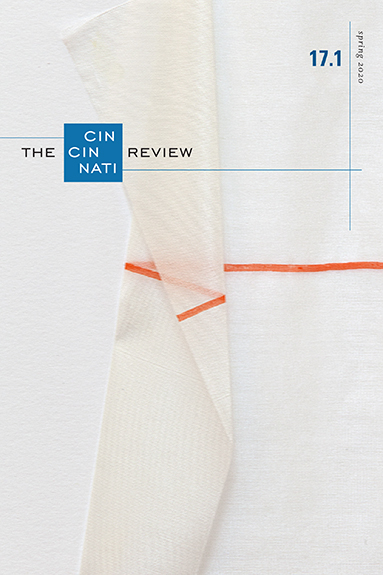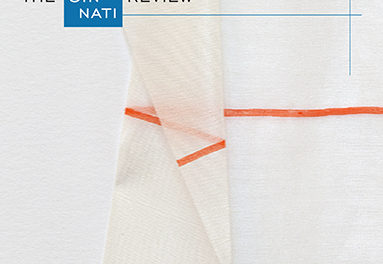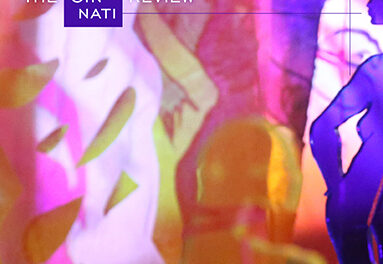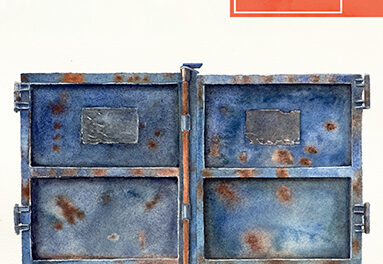You can see them, if you look closely, in all the old photographs: my fingers flush at the knuckles and nails, squeezed tight as window blinds so no light can slip between.
It’s Christmastime in this one. We’re standing in front of the flocked plastic tree. The parcels beneath it, shiny gold with silver bows, reflect the camera’s flash. What you don’t know is that they’re empty. Well, not quite. Long ago my mother wrapped twenty boxes—small rectangles and wide squares, even one plump circle with a string—after filling each with rice and tissue paper, hefty balls of yarn. We put the boxes out after Thanksgiving every year. We put them away on New Year’s Day. The real presents aren’t as pretty because, as my mother always said, “What’s the point? You’re just going to tear up all my hard work anyway.” Over the years, her own mother had wrapped socks and underwear in sections from the Sunday Times. Nothing good to read, not even the funnies. Christmas came from my grandparents in stock-market graphs and classified ads.
“You think you have it bad?” my mother asked from time to time—always abruptly, always out of the blue. “Imagine being raised by them. Imagine what I went through.”
In this picture, my hand clamps my father’s arm like a single cuff, the thumb a shortened hem pulled taut. “Put your feet right!” my mother scolds, demonstrating third position in ballet. We are always made to stand this way: one foot turned outward in our good shoes, one heel lightly touching the other foot midway. “Say Magi!” We hold our spines straight and bare our big teeth: identical smiles. Beside our posed feet lurks one of fifteen nativities, give or take. Everyone’s white and made of brittle stuff, like us. The mock hay comes from coupons crimped with a ribbon cutter. Magi!
I want to tell you when it first began, this bracing: my fingers turned to slats, my hands two shades repelling sun. But all I can do is show you the before and hope it sheds a bread-crumb trail to the after. As in:
This is 1983, and I am four years old, tall for my age and with a spiral perm that adds another inch or more. The local YMCA offers Saturday dance: ballet for girls in first and second grade. There’s my leotard—purple with white stripes—plus soft pink tights and stiff pink shoes. Mom says, “Your dad’s going to take you to your first class. Now just remember what we said: if anyone asks your age, tell them you’re seven.”
It’s a lie, and I’ve been in trouble for lying before—just this year in Mrs. Levrington’s preschool room. I was lonely on the playground with no one to push me on the swings, so I made up a story: “All the girls put stickers in their cubbies that say they’re members of The Brat Club.They made a pact and pinky-swore they would never let me in.” Remarkably, my mother believes me. Outraged, she telephones the school. That’s when my teacher tells her the stickers don’t exist, the cubbies are clean—she empties and scrubs them every day. Still, my mother persists on my behalf. “Children are crafty. I’m a teacher too, so I know how it goes. Maybe they hid their stickers. Maybe they wrote those words on another kind of badge.”
In the kitchen, I squat below the counters, listening in, one hand cupped over the mouthpiece of the mustard-yellow phone. My fingers are messy here, not yet lined up like sausage links in their packages, but splayed. This is still before. This is when I fear my mother but love her too, for a quality I can’t yet name: loyalty in absurdity,let’s say.
“But Mrs. Wade, there’s another matter,” the teacher haltingly explains. With my held breath and my bongo heart, I pity Mrs. Levrington; it is hard to have to contradict my mother. “You see—” clearing her throat—“Julie is my only pupil who knows how to read and write.”
No one ever asked if I wanted to dance, but Mom insists it’s important—for “present poise and future grace,” she says. I study the bright brochure of cheerful girls in various states of twirl. Then: “What does in-ter-me-di-ate mean?” I broach from the back seat.
“That you’re not a beginner,” Dad replies. But of course I am! This is still before: before years of ballet at the Southwest Community Center; before tap and jazz are added to my repertoire because I “might be better suited.” This is before I’ve ever heard anyone say: “Sometimes you have to fake it till you make it.” Fake how? Make what?
“Come to the barre now,” the teacher summons. Here the girls wear ponytails, braids, or buns. My hair is a bird’s nest with a bobble like two blue eggs. “Show me what you remember,” she says. “First position.” I copy the feet in front of me. “Second position.” I am precise as a Xerox machine. “Now third,” the teacher instructs, and I marvel that we are ready for pictures. Say plié!
My father sits on a folding chair in the corner, the only man there. Some mothers cluster by the door. There is bending down and rising up, using your arms to trace a curve across the sky. I look at my father, who points to the teacher, urging me to pay attention. Everyone else wears a skirt, I see. They tie in the back like aprons. How naked I feel without one, my long flamingo legs exposed. Soon the teacher is asking for PK turns (which I later learn are piqué ).One by one, the girls unmoor, make calculated movements across the floor. When I try to do what they do, I get dizzy. I’m tall too, but different in my body, less knowing. When I fall, the teacher leans over me and asks, “Julie? Is it Julie or Julia?”
“No a,” I say.
“Julie, where did you dance before?”
I shake my head, will not be fooled—scuttle away like the beetle I am. I bet none of these girls would push me on the swings either. They cluster together like their mothers. There is some talk of sugar-plum fairies and a Nutcracker play; then the teacher approaches my father. Arms again, synchronized in motion. Are their fingers splayed? Are their muscles taut? Dad calls me over, tells me we’re going home.
“Don’t feel bad, Smidge,” he says, ruffling my beauty-school curls. “You just weren’t ready.” But I will win a spelling bee on intermediate a few years later.
Another before, this one harder: We go to meet my mother’s parents in the country. I have often imagined them there—chimney puffing on their cottage in the woods, sloping roof and winding stairs my grandfather built in his long career as a carpenter.
“His name is Elwood,” my father says. “He’s no wordsmith, but he’s good with his hands.” And, for a moment, the world aligns in language—the wood of his name, the wood of his work. I picture him as the Woodsman from Little Red Riding Hood.
My grandparents live in a clearing called Black Diamond. This is before I learn about black-diamond ski slopes, before I understand the symbol as explicit caveat—to mark a place beyond which only experts should pass.
My mother rouges her cheeks in the front seat. “We’re not staying long,” she decrees. “They met you once as a baby. My sister did too. She lives next door in a house our father built for her, free of charge.” The compact snaps shut. The mirror in the sun flap comes down for a wider view. “She didn’t want kids, your Aunt Sharon, but when she saw you, she changed her mind.” I puff up a little until my mother clarifies: “I was praised—for the first time in my life—when I came here with a babe in arms. She wanted that praise, like everything else. She made her daughter into a prize.”
Over the river and through the woods to Grandmother’s house we drove. I didn’t sing because everyone was somber. The trees pointed like swords, so tall I couldn’t see their tops. Even the daylight could barely seep through. “Stay clean, and don’t wrinkle your dress.” My mother straightened my sash. My father patted my head. We followed a path of pinecones to the door.
In one version, recall, the Wolf swallows the Grandmother whole. Later on, she is cut out of his gut by the Woodsman and somehow—miraculously—survives. In another version the Grandmother dies long before Riding Hood ever arrives. She is a casualty or, perhaps, a sacrificial lamb.
My grandma Tena Vera has silver hair and azure eyes. Her face is striking, but she seldom smiles. I appraise her hands: ghostly pale and icy cold. I wonder if she might be the Wolf in disguise.
“Come into the living room,” she summons. “Let me get a good look at you.” We study each other in the best available light.
“Are these curls natural?” Grandma asks, then tugs my hair so hard I wince in pain.
“Of course they are! What kind of question is that?” my mother replied.
“No hot rollers?”
“Just a brush and a spray. That’s all it takes, every day.”
“No permanent either?” Are my fingers fusing now? Is this how it begins? I feel my body harden like a lozenge.
“Do you actually believe I would perm a child’s hair? She’s in kindergarten!” my mother protests.
“Well, I wouldn’t put it past you. You’ve always envied the ringlets on Sharon and Steve.”
“Who’s Steve?” I ask, a little too loudly.
“He’s your uncle.”
“I thought that was Thor, like the god in mythology.” I watch Grandma cringe, as if the tin of my voice hurts her ears.
“Thor is married to your mother’s sister. Steve is your mother’s brother.” We follow her now into a carpeted kitchen. I have never seen carpet in a kitchen before. At the table a bald man in a flannel shirt shuffles a deck of cards. He wears a vest with many pockets, like fishermen I have seen at the shore.
“That’s your grandfather,” Grandma says tersely, pointing.
“Do you fish?” I rest my hands—there they are, still loose—on the table beside him.
Elwood raises his eyebrows, thick as spun sugar, doesn’t reply.
“Sharon will be over in a minute. She’s not eating right now—some liquid cleanse I don’t press her about—but I’m still making lunch, and she can bring that thermos if she wants.” Grandma waves her hands like she is shooing birds. “Bill, will you take him in the den to watch a sports game or something?” My father, strangely quiet, complies.
It is a lot to remember, but I do: Sharon is one year younger than my mother and married to a man named Thor, who is two inches taller than my father. He owns a carpet business. (Is this why there are no bare floors?) Thor drives a brown van to carry all his carpets, but once, he lost control and crashed into a 7-Eleven. His blood sugar got too low, they said. He was trying to get to the store to buy some Life Savers or gummy bears, but he blacked out and drove right through the main window. In the hospital he couldn’t remember his name or his wife or Ronald Reagan in the White House, but the nurse showed him a wallet picture of his daughter, and he knew her right away. He said, “That’s my Blythe. That’s my baby girl.”
Blythe is one year younger than I am, blonde like her father and like her mother used to be. Everyone in the family is proud of this fact. They talk about her blondeness like a trophy she has won, the gold medallion of hair rippling down her back, Rapunzel-style. She could make lovely ponytails, braids, and buns with hair like that, I muse, then wonder if she has ever danced ballet.
. . .
“Perfect Hands” was the winner of the 2019 Robert and Adele Schiff Award for prose.











